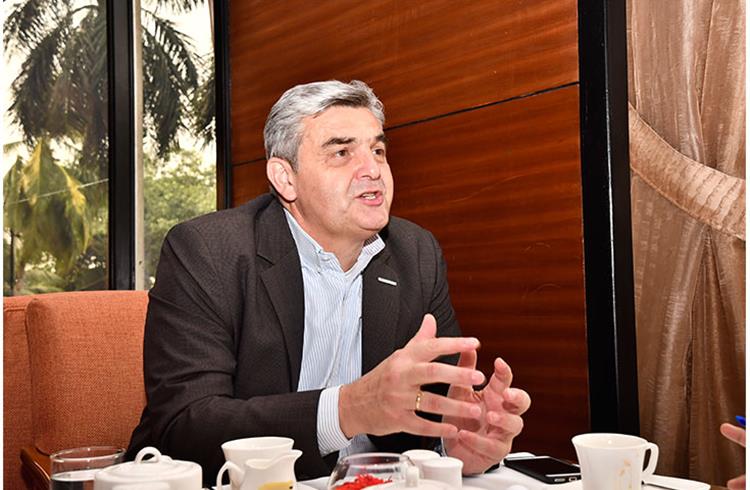Freudenberg India’s Georg Graf: ‘Lessons from 2008-2009 crisis taken, but Covid-19 impact is much more.’
Georg Graf, Freudenberg's Regional Representative (India), is looking at lessons learnt during the 2008-2009 crisis to fight the challenges thrown by Covid-19 but admits the situation this time is way more serious.
Georg Graf, Freudenberg Regional Representative of India, who has close to four decades of working experience, probably knows better than most about the difficulties businesses are facing in restarting their operations amidst the lockdown.
German technology provider Freudenberg Group which has about half-a-dozen Research & Development (R&D) centres and 16 production sites worldwide, including those for the automotive segment, recently resumed operations at all its plants, including India, in a staggered manner. These plants are spread across six Indian states and Union Territories. Graf, who has been closely monitoring the entire process explains the irony: "It is interesting to see that, for example, a company that is making online applications for reopening a plant sees a lot lesser processing time, but at the same time movement passes for individuals need a waiting time of hours!".
The lockdown due to Covid19 and the resultant slowdown is not the first crisis Graf is firefighting in India. In fact, soon after stepping up to take charge as President of Finance, IT & Administration at Kluber Lubrication (India), a subsidiary of Freudenberg Group in 2008, Graf came across his first major headwind. The financial global crisis of 2008-2009, which had majorly impacted the world economy including India albeit on a milder scale.
However, Graf is emphatic that the situation this time the crisis is far more severe. According to Graf, bringing operations back to normal is not going to be easy as uncertainties are high, liquidity low while the time to act or re-act is limited. "Most businesses are surviving the downside of a crisis, but not the upside phase anymore. We have learned some lessons from the 2008 and 2009 crisis but the Corona crisis has an additional impact: businesses can undergo a high risk in not surviving the revamping of operations after a crisis" adds Graf, who also holds the added responsibility of being President of Indo-German Chamber of Commerce (IGCC).
IGCC is part of the worldwide network of 140 German Chambers of Commerce abroad, located in 92 countries. With over 5,500 members, IGCC is the largest AHK and bilateral Chamber of Commerce in India. Headquartered in Mumbai, with six branch offices (Delhi, Chennai, Kolkata, Bengaluru, Pune, and Düsseldorf), the lobby group is acting as a catalyst for the promotion of trade and industrial relations between India and Germany.
A tense future
Freudenberg Group, which has business ties with customers in India since 1920 has had a fairly decent business growth last year. In April, the company announced its India business clocking sales growth of 5.7 percent at Rs 2,533 crore in 2019 as against Rs 2,401 crore in 2018. Despite the global slowdown, the company recorded flat sales at Rs 74,583 crore in 2019 (2018: Rs 76,235 crore). In 2019, the Grroup invested Rs 3,789 crore in R&D activities compared to Rs 3,582 crore in 2018.
Graf attributes the reason behind its impressive performance partly to the company strategy of focussing on mobility, digitalisation, and sustainability during the period 2018-2019.
India remains a key growth driver
For Freudenberg, India remains the principal growth driver. The company in its last annual report had forecast economic growth of 5.5 percent. However, the situation has changed drastically since then. According to Graf, the macro-economic environment in FY2021 will remain challenging as geopolitical and economic uncertainties are unlikely to ease.
Against this backdrop, it is imperative that businesses should be cautious in planning for the coming year and anticipate subdued business performance in automotive markets. The changes in mobility, digitalisation, and sustainability solutions will continue to remain important strategic topics. Graf further has outlined that all new challenges must rightly be discussed, planned, and then executed. "The learning curve for each organisation will be high, it needs workforce, and additional investments and it will increase cost impact towards investments," he added.
EV progress may slow down but not stop
Despite the adverse impact caused by Covid19 on the automotive industry in India, Graf is of the view that a majority percent of all vehicles sold in 2030 will have some level of electrification (hybrid, electric, fuel cell). "The current crisis might impact the trend or electrification progress, but it will not stop it or significantly change it – at least what we have learned so far and we have not yet seen the peak of the pandemic. Industries have invested a lot already. Innovations created will still remain important and will continue to remain important in the long term as well," he signed off.
RELATED ARTICLES
IIT Bombay inaugurates Arun Firodia Research Floor
IIT Bombay, one of India’s top technical and research institutions, honours Kinetic Group chairman Dr Arun Firodia, one ...
Maruti Suzuki expands capacity at Manesar plant by additional 100,000 units
New assembly line at Plant A expands total manufacturing capacity at the Manesar plants to 900,000 units per annum. Alon...
Hyundai and Kia partner Exide Energy to produce LFP batteries in India
Partnership with Exide Energy enables Hyundai Motor and Kia to equip future EVs in the Indian market with locally produc...





 02 Jul 2020
02 Jul 2020
 6901 Views
6901 Views





 Autocar Pro News Desk
Autocar Pro News Desk




